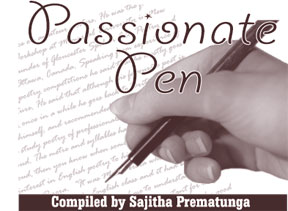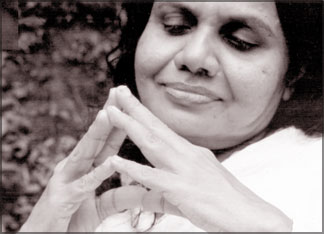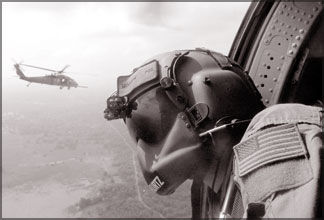Out of the box
By Sajitha PREMATUNGE
 She gave me early warning, so I wouldn't be put off. "I like to keep
my garden as wild as possible. But my neighbours are afraid that they
would get dengue." Upon entry to the house I realized that I made a
mistake in selecting to interview this particular person as a writer.
The living room was stripped of furniture, save for a couch. Although
she was by no means a bad writer, I realized that her favourite pass
time was not writing - it was meditation. Invariably - after explaining
the obvious about the lack of furniture Sunethra Rajakarunanayake went
on to explain her love for meditation. She gave me early warning, so I wouldn't be put off. "I like to keep
my garden as wild as possible. But my neighbours are afraid that they
would get dengue." Upon entry to the house I realized that I made a
mistake in selecting to interview this particular person as a writer.
The living room was stripped of furniture, save for a couch. Although
she was by no means a bad writer, I realized that her favourite pass
time was not writing - it was meditation. Invariably - after explaining
the obvious about the lack of furniture Sunethra Rajakarunanayake went
on to explain her love for meditation.
Coming from an Anglican background it is quite surprising that her
interest for meditation goes further back than her interest for writing.
In fact it is probably safe to say that she started writing as a result
of her interest in meditation. She was only 13 when she wrote a book on
meditation and circulated it among her school mates. But people identify
her in many ways, generally as an artiste. Among other things she has
dabbled with documentary, journalism, drama and art. But her interest
for meditation had managed to seep into most of her columns and novels,
specially her Sinhala novels like Premapuranaya and Ridee Thiranganawi.
Even her newspaper columns, specially all episodes of Mathaka Potha,
always ended in some sort of philosophical note.
She is currently working on a novel, the name of which she did not
wish to reveal and an English version on her novel Sathgunakaraya, named
Spirit of Paththini.
Her new novel Podupurushaya is set in Kilinochchi and revolves
around, what turns out to be an imaginary earthquake at the end. "I have
so many plots in my head, but no time slots!" She said laughing.

Speaking of her childhood she said "When I was at school I was never
really good in English. I used to speak in broken English, but was
always an avid reader. I read anything that I could get my hands on. I
learned Geography simply by reading. I have never been to a tuition
class. My vocabulary improved impressively by reading." By age 18 she
translated a book of Galilee, for Pragna Publications. From then on she
was inspired to translate English into Sinhala. "Good translators need
to be competent in both languages." Translations should be encouraged in
Sri Lanka, she reiterated. "It need not come from the government, it
could very easily be done by the private sector. There should be an
annual translation anthology.
An accusation levelled at most Sri Lankan writers is that their
portrayal of 'Sri Lankan life' does not depict reality. But Sunethra's
writing is obviously based on first hand experience in terms of setting.
"I don't generally write about places I haven't been to." She further
explained that in order to make a detailed portrayal one has to creep
into the character. "Film makers do the same thing, they have to
penetrate deep into their characters. They are my arudas, for me it's
like being in a trance. If you are writing about a prostitute, you have
to put yourself in her shoes. The same goes for a murderer."
However she revealed that although her settings are always based on
first hand experience she has not faced such dramatic situations as her
characters. "Although I wish I had." She said laughing. "People think I
have faced all those wild romantic experiences, but I haven't." However
she claimed that she is a romantic at heart and can create vivid plots
with ease. She reiterated the fact that 'experience' for a writer is of
immense importance. And said that a person who has travelled extensively
has a better advantage and can produce a rich piece of writing.
According to her being able to produce a realistic portrait demands a
tremendous amount of creativity.
"You can't create something out of nothing. If a person who is
writing about war - has not experienced war - he cannot produce a
convincing piece." She said that one can always leave it to ones
imagination but argued that, then her accounts of Kilinochchi, in her
short story SMS, would not have been as realistic. "Writing should come
from the heart."Most of her stories indicate that she does not heed the
taboos of conservative Sri Lankan culture. "I never think about taboos."
The third party guest - which was very well received even among Sinhala
writers - and the Last Story, of Sambol+ - written from a perspective of
a daughter, regarding her gay father defy taboos of the conservative Sri
Lankan culture, in that it deals with a subject most writers choose not
to talk about - homosexuality. "If I had been afraid of taboos, I would
not have been tempted to write the latter." But claimed that people are
less inquisitive about such stories. "I have written about gay men. I am
not a man and am certainly not homosexual. But I had a lot of gay
friends." She explained that while she was in California, she was
exposed to a whole new culture and that she incorporated those
characteristics into her characters.
"Perhaps some self appointed moralists may have been shocked,
specially a woman writing about a gay man." and said that if one keeps
thinking about taboos one can't be creative. She claimed that she has
not written anything that has not happened in Sri Lanka. "In fact these
things have been happening for a long time." She said that artistes
can't worry about taboos if they want to be creative. But they have to
know how to present it.
Concerning the popularly held belief that her novels are
cosmopolitan, she claimed that critics may have been tempted to think so
because some of her novels are set in big cosmopolitan cities like San
Francisco and New York. Although she explained that the 'cosmopolitanness'
is restricted to her English writing. But Sambol+ definitely has a more
Sri Lankan ring to its stories. Although she believes that the critics
have meant it as a compliment when they referred to her writing as
'cosmopolitan', she says that if they go through Sambol+ they would be
in for a surprise. "I intended it for those who don't read much Sinhala.
That's why I tend to explain all the Sinhala words in detail."
She explained that she preferred to use more Sinhala words in her
English writing. But it meant having to explain every word. "I am very
confident about my Sinhala. I feel the pulse of the 'average people'. I
speak and read really good Sinhala, but am still comfortable being
bilingual."
She stressed the importance of experimenting with language, for a
writer. In fact she wrote her first novel in Sabaragamu Sinhala. And
said that it arose out of a need to experiment on the colloquial aspect
of the language.
She was the first to coin words such as 'politicco' in her Sinhala
novels. She said she always tries to be innovative in selecting a title
for her novels. "I always try to think out of the box."
The crying sky and the mango tree
by Chintha HEWAGE
 It
is amazing to see the tears of the sky wash away our dirt. When the sky
cries the whole world cries. The trees, the leaves, the beautiful
blossoms and even the rocks cry under the crying sky. I've always
preferred to listen to her crying. I could lose myself in the clammy
cold sensation when I didn't have to go out. Her tears had always washed
away my pain and today, I want the sky to cry for me. Cry with me.
Besides I knew that she was going to cry, any moment. It
is amazing to see the tears of the sky wash away our dirt. When the sky
cries the whole world cries. The trees, the leaves, the beautiful
blossoms and even the rocks cry under the crying sky. I've always
preferred to listen to her crying. I could lose myself in the clammy
cold sensation when I didn't have to go out. Her tears had always washed
away my pain and today, I want the sky to cry for me. Cry with me.
Besides I knew that she was going to cry, any moment.
My son went to school in the morning not knowing that the sky was
going to cry. My father blamed the murky weather for accosting him from
his morning exercises. The gloomy patches of darkness barred the solar
shine apparently resulted in the beautiful daughters of the trees to bow
down dolefully. The wind didn't blow. The leaves didn't fan the world.
They didn't glow for an unspoken sadness was dripping all over them.
When the Air Force vehicle approached our doorstep, I braced for what I
had dreaded for the past 10 years.
After ten heavy minutes I watched unbiased that the car disappearing
from the gate keeping my parents glued to the chairs. Then I ambled to
the garden, not knowing what to do, or where to go. The energy and the
warmth in my body was drained suddenly that I felt a chill wrapping my
whole body. My feet stalked towards the magnificent mango tree, stood in
the corner of our garden who had always been a silent observer. He had
always loved this tree. We used to spend the whole night under the tree
when he was home.

"This tree gives me the energy of life" he would say. Today I needed
that energy for the first time in my life, for the liveliness is drained
from my body as from the world. The sun has vanished from the world
leaving every living organ lethargic and pale. The birds did not chirp,
the squirrels devoted to the miserable quietness invaded our once
cheerful garden. It was a sheer burden to endure that loneliness.
I braced for this day from the day I laid my eyes on him. I've always
wanted to marry a rock star with a long hair and probably with an
earring. Somehow without the slightest awareness of mine he invaded my
heart.
I fell for this drop dead gorges fighter pilot. He was a very gallant
man. His suntanned skin and the scar on his forehead emanated his
bravery. He possessed a prominent scar on his forehead from combat in
which his aircraft blasted and his life was saved with the aid of a
parachute.
"Every scar on my body has a story" he would say gallantly. My
husband was a brave man. A true fighter pilot. My inside murmured. Now
the thought that he wouldn't come back made my stomach squirm, my
insides writhed with pain. Suddenly I felt as if I had been beaten to
death, and the sky started to cry. She cried for me. I felt my tears
trickling down my cheeks. But the mango tree didn't cry. It stood still
heartless, motionless, senseless. How ironic that the tree has forgotten
him so easily. Why couldn't I do that? Then this heartbreaking pain
would not have pricked at me. I envied the magnificent mango tree. Maybe
it didn't mind the loss. Maybe it expected it. Then suddenly it struck
me. Didn't I expect this day.
Didn't I know it would be any moment? I raked my brain to find a
reason to fight the heartache.
On the other hand I should be proud. He was killed in action and died
as a hero. He will be honoured with 21 gunshots. He will be promoted.
No! his dead body will be promoted. My mother's anxious voice darted
through the thick air calling me in. my son arrived home and my father
dragged him inside. Sky went on crying glaring at me with her sulky
eyes. I couldn't recon, why the sky was crying for me. I didn't want to
be pitied.
Besides I was a hero's wife.
Actually, a hero's widow. Well, I had his son.
His own flesh and blood. I had my memory of him.
I had his medals.
I will live. I will somehow bear it and live. The knowledge of the
necessity to brace for the unstoppable future, gathered me the courage.
I made myself stiff and bold. Suddenly the sky billowed. "You don't have
him." I fell to pieces.
The so-called memories of him started doing no good but haunt me. Ten
years back, met him in a party. He was excessively charming in his
uniform. Even his voice was attractive. Nevertheless the truth was not
so charming to my parents. "Have you lost your mind?" they lamented.
The memory made me feel betrayed. He dragged me in to this heartache.
Now he is gone, leaving me only pain. I wanted nothing but to yell at
him, smash at him with my sourness coagulated with the bitterness of the
world around me. Suddenly the sky cracked and started lamenting.
It howled shaking the mango tree, with me under it. Then it happened.
The mango tree cried dousing me in its tears. The world lamented
shaking every living and non living object in it. The trees swayed in
pain with their flowers, fruits, leaves shattering and scattering on the
ground.
He will not come back again. To me. Under this mango tree. Each and
every one of life's interests seemed to have been snatched away from me
maliciously. I, a tiny speck in the universe, sensed a horrifying chill.
I no longer needed the ruthless mango tree in the garden. The weeping
irritating mango tree. It will haunt me forever. It will draw back the
unpleasant memories of him.
It will laugh at me.
It will pity me.
"Poor widow"
I loathed the tree the most.
My hands did not feel the pain of thumping the tree trunk as much as
'it' didn't feel. I wanted to siphon my misery. He left me. I stood
pitifully owning nothing but loss. I banged my head against the tree
yelling at it with tears as well as water trickling down my body. I
could hear even the faint screech of the mangoes and the leaves. My
son's yell reached me from a distant though the commotion of the
raindrops battering over my ears. I dropped to the ground writhing in
pain. I heard the 21 gunshots banging in my ears beating my pain and my
yell.
(A tribute for millions of military wives around the world who
possess bravery and the courage to bear grief, so that you and I enjoy
with our families.)
|

